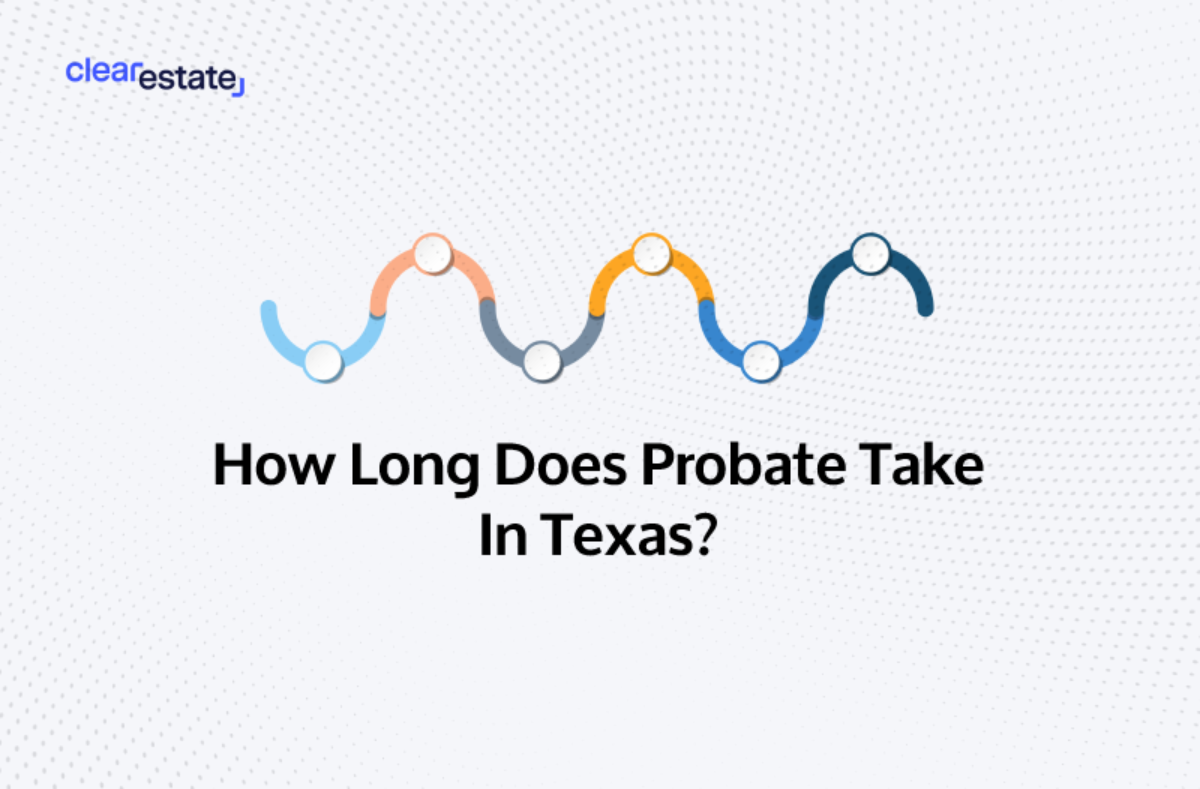
The content on this page has been reviewed by qualified CFP's, TEP's, Tax accountants & Practicing and past lawyers to ensure it is factually accurate, meets current industry standards and helps readers achieve a better understanding of probate, estate planning, and estate taxes for your loved one.

In Texas, the duration of the probate process can vary significantly. For simple estates, especially those with a self-proving affidavit in their will, probate can be expedited, taking as little as 3 months.
However, in cases where the estate is more complex, or if there's no will or the original will is contested, the process might extend from 9 months to over a year or possibly even longer.
let's take a closer look at what might influence the duration of a probate case:
Probate without a will often demands a more extended period due to increased court oversight. The process, termed "determination of heirship," ranges from five weeks to potentially over 9 months.
The absence of a will necessitates additional legal procedures, including appointing an attorney to identify all familial heirs, validating their inheritance rights, and attending several hearings.
For smaller estates valued at $75,000 or less, Texas offers a more streamlined "Small Estate Affidavit" process, which involves completing and submitting a designated form to the local probate court.
Regardless of the scenario, the broader probate process encompasses multiple stages:
Given the myriad of variables and potential complexities, it's challenging to pinpoint a definitive probate duration. Yet, it can span from a few months to several years.
Essential formalities, such as mandatory waiting periods before hearings or a six-month window for creditors to raise unpaid debt claims, further impact timelines. Additionally, the specific procedures of each Texas court can influence the probate timeline.
The Typical Probate Timeline in Texas
| Step | Action | Description | Estimated Timeline |
|---|---|---|---|
| 1. | Locating the Original Will | The first task involves tracking down the authentic will. | 1-2 weeks |
| 2. | Initiation | File the original Will along with an application for its probate and issuance of Letters Testamentary. | 1-2 weeks |
| 3. | Notification | The County Clerk publicizes the probate application, primarily through courthouse postings. | 2-4 weeks |
| 4. | Hearing Arrangement | After the due notice period, a hearing is slated to discuss the Will's admission to probate. | 3-5 weeks |
| 5. | Validity Verification | At the hearing, the Executor testifies regarding the deceased's details and attests to the Will's legitimacy. If the Will isn't self-proven, additional witnesses may testify. | At The Hearing |
| 6. | Executor's Oath | Post-judge's approval - at the initial probate proceeding, the Executor swears an oath to uphold his/her duties and, in turn, receives Letters Testamentary. | Immediately Post Hearing |
| 7. | Notice to creditors | A public notice, appealing to the deceased's creditors, is broadcasted through a newspaper within a month post receiving Letters Testamentary. (Creditors have up to 6 months to make a claim) | 4-6 weeks |
| 8. | Lien Notifications | Within two months of getting Letters Testamentary, the Executor notifies creditors holding liens on the estate's assets. | 5-8 weeks |
| 9. | Beneficiary Alerts | Certified letters are dispatched to Will's beneficiaries, sharing the court order and a copy of the Will. This is executed within 60 days post court order. | 8-10 weeks |
| 10. | Affidavit of Notification | Within 90 days of the court order, the Executor submits an affidavit to the court verifying that beneficiaries have been duly informed. | 10-13 weeks |
| 11. | Asset Inventory | An exhaustive list detailing the estate's assets, their valuations, and any claims against them is filed within 90 days of the court order. | 10-13 weeks |
| 12. | Tax Duties | The final income tax return for the deceased is submitted by April 15th of the subsequent year. | Before April 15th of the next year |
| 13. | Estate Taxes | Applicable for sizable estates. | As applicable |
| 14. | Creditor Claims | If a creditor stakes a claim against the estate, the Administrator has a 30-day window to acknowledge or decline it. | Within 30 days of the claim |
| 15. | Creditor Payment | Based on the Texas Probate Code, creditors are classified and compensated according to their category. | Varies |
| 16. | Estate Distribution | Estate assets are allocated as the Will dictates. | Varies, typically towards the end of the probate process |
| 17. | Title Transfers | New ownership titles are issued for assets like vehicles and boats. | Towards the end of the probate process |
To help with your timeline estimations, we've built this quick and easy probate timeline estimator: